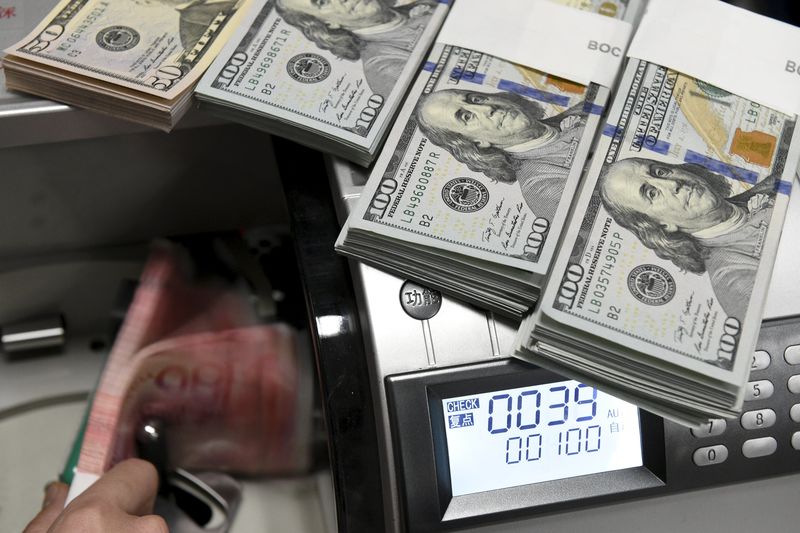(Bloomberg) -- Europe’s resurgent common currency is looking powerful enough to get people talking about ‘King Euro’.
The currency has rallied more than 10% since virus turmoil shook global markets in March, buoyed by the European Union’s policy response to the crisis and as rock-bottom interest rates in the U.S. weaken the dollar. Hedge funds are now betting on another jump higher to $1.25 after U.S. elections, with options seeing the most bullish August on record.
It’s part of a wider trend that’s got Mizuho International strategists bestowing the title of king of currencies on the euro -- an accolade normally reserved for the greenback -- as uncertainty around November’s U.S. presidential vote helps to further burnish the appeal of European assets.
While the dollar typically gains in the months after election results, a win for President Donald Trump’s challenger Joe Biden could hurt the currency next year as the Democratic nominee has called for boosting taxes on wealthier Americans and increasing federal spending to spur a U.S. economy battered by the pandemic. Biden is leading in the polls.
“Building expectations for a Democratic sweep have likely played a role in weakening the dollar and strengthening the euro,” said Lee Hardman, foreign exchange strategist at MUFG Bank Ltd. in London. “Whether that continues ahead of the election will depend on whether the race tightens or not.”
Of course, other factors will also determine the euro’s future, not least the extent to which the region’s growth outpaces that of the U.S., and how well both sides of the Atlantic manage to control the continued spread of the coronavirus.
The Federal Reserve’s stance is also in focus, with Chair Jerome Powell announcing Thursday that policy makers will let inflation run higher. That’s a shift negative for the greenback, according to Jim Caron, portfolio manager in global fixed income at Morgan Stanley (NYSE:MS) Investment Management.
Still, forecasting market moves after an election is more of an art than a science. Either way, the vote is now the key event on traders’ horizons. Option markets show investors bracing for turbulence in the euro-dollar pair three months from now, then seeing volatility cool off gradually.
That’s not stopping hedge funds from betting the euro will trade above $1.25 after the elections, according to traders and brokers in Europe familiar with the transactions, who asked not to be identified because they aren’t authorized to speak publicly.
Renewed optimism for the euro’s prospects is also being reflected in options trades that have gone through the Depository Trust & Clearing Corporation this month. August has seen the greatest demand for exposure to euro gains since Bloomberg began compiling data, at twice the volume of bets on a downturn.
“The U.S. election has likely been a dollar-negative story insofar as a Democratic-led government could be associated with higher regulation and more taxation,” said Jane Foley, head of foreign-exchange strategy at Rabobank in London, consistently a top forecaster in Bloomberg rankings. “The euro could benefit from this by default -- and probably already has.”
Some investors are placing sizable bets for an even bigger surge to $1.28 next year. That would be an 8% increase from current levels, and would take it to the highest since 2014. Other gauges of market positioning and sentiment for the next two years are flashing levels of bullishness on the euro seen only a few times in more than a decade.
Priced In?
Still, analysts say that in the shorter term the Biden effect may already be priced in. While MUFG forecasts the euro to end the year up about 1.5% at $1.20, it recently suggested tactically selling the euro against the dollar, expecting a correction after the common currency’s sharp gains. The median forecast in a Bloomberg survey sees the euro at $1.18 in both the third and fourth quarters of 2020, little changed from its current level.
The euro’s rally could stall or backtrack if Trump wins a second term, unraveling regulation and delivering business-friendly policies. Bad news could also come if the virus leads to renewed lockdowns in Europe and sluggish economic data.
But that’s an increasingly niche view. Regardless of the U.S. election, Standard Bank’s head of foreign-exchange strategy Steven Barrow sees the euro climbing to $1.25 in six months. That would take it back to levels seen in early 2018, before two years of steady declines shook the faith of those calling for an end to the U.S. dollar’s hegemony.
New Haven
“My view is the dollar is going down and it doesn’t matter who wins,” Barrow said. “Countries like the U.S. have developed these huge current-account deficits that require inflows of capital, and the U.S. is going to stretch that further. U.S. assets are perhaps overvalued.”
And on the euro’s side, the agreement among EU leaders over a recovery fund has boosted the common currency’s credibility. That followed a myriad of political troubles that led investors to question if the bloc could stay together, from Brexit to Italy’s budget fights with the EU and pressure on the leaders of France and Germany.
Now the euro is emerging as a haven, according to Peter Chatwell, head of multi-asset strategy at Mizuho. The euro’s gains have outstripped the other traditionally safe currencies, the Swiss franc and yen.
“There is plenty of time for the ‘King Euro’ theme to run,” said Chatwell. “It can compete with the dollar for being the western currency of choice for trade purposes, and can compete more generally with other safe haven currencies as being a credible, long-term store of capital.”
